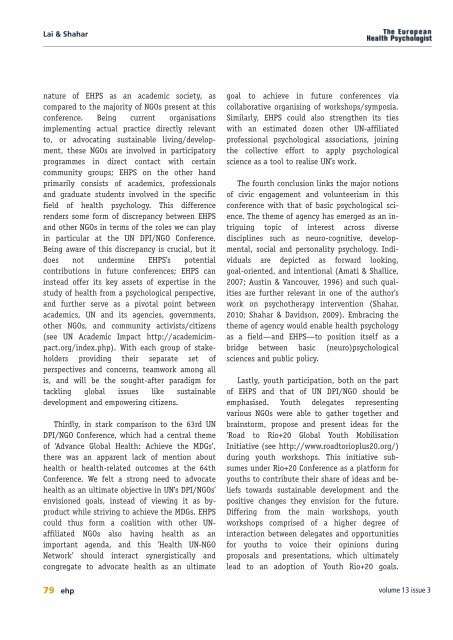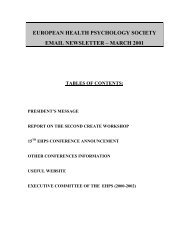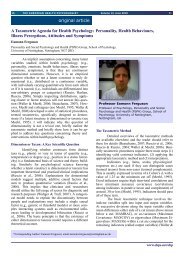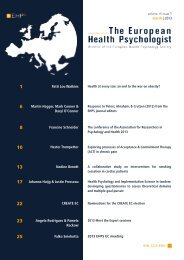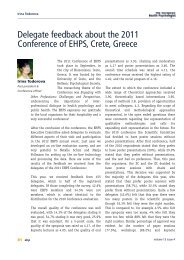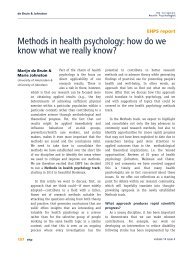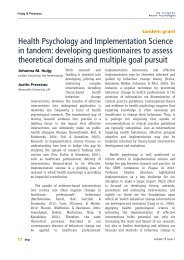PDF download entire issue - European Health Psychology Society
PDF download entire issue - European Health Psychology Society
PDF download entire issue - European Health Psychology Society
Create successful ePaper yourself
Turn your PDF publications into a flip-book with our unique Google optimized e-Paper software.
Lai & Shahar<br />
nature of EHPS as an academic society, as<br />
compared to the majority of NGOs present at this<br />
conference. Being current organisations<br />
implementing actual practice directly relevant<br />
to, or advocating sustainable living/development,<br />
these NGOs are involved in participatory<br />
programmes in direct contact with certain<br />
community groups; EHPS on the other hand<br />
primarily consists of academics, professionals<br />
and graduate students involved in the specific<br />
field of health psychology. This difference<br />
renders some form of discrepancy between EHPS<br />
and other NGOs in terms of the roles we can play<br />
in particular at the UN DPI/NGO Conference.<br />
Being aware of this discrepancy is crucial, but it<br />
does not undermine EHPS’s potential<br />
contributions in future conferences; EHPS can<br />
instead offer its key assets of expertise in the<br />
study of health from a psychological perspective,<br />
and further serve as a pivotal point between<br />
academics, UN and its agencies, governments,<br />
other NGOs, and community activists/citizens<br />
(see UN Academic Impact http://academicimpact.org/index.php).<br />
With each group of stakeholders<br />
providing their separate set of<br />
perspectives and concerns, teamwork among all<br />
is, and will be the sought-after paradigm for<br />
tackling global <strong>issue</strong>s like sustainable<br />
development and empowering citizens.<br />
Thirdly, in stark comparison to the 63rd UN<br />
DPI/NGO Conference, which had a central theme<br />
of ‘Advance Global <strong>Health</strong>: Achieve the MDGs’,<br />
there was an apparent lack of mention about<br />
health or health-related outcomes at the 64th<br />
Conference. We felt a strong need to advocate<br />
health as an ultimate objective in UN’s DPI/NGOs’<br />
envisioned goals, instead of viewing it as byproduct<br />
while striving to achieve the MDGs. EHPS<br />
could thus form a coalition with other UNaffiliated<br />
NGOs also having health as an<br />
important agenda, and this ‘<strong>Health</strong> UN-NGO<br />
Network’ should interact synergistically and<br />
congregate to advocate health as an ultimate<br />
goal to achieve in future conferences via<br />
collaborative organising of workshops/symposia.<br />
Similarly, EHPS could also strengthen its ties<br />
with an estimated dozen other UN-affiliated<br />
professional psychological associations, joining<br />
the collective effort to apply psychological<br />
science as a tool to realise UN’s work.<br />
The fourth conclusion links the major notions<br />
of civic engagement and volunteerism in this<br />
conference with that of basic psychological science.<br />
The theme of agency has emerged as an intriguing<br />
topic of interest across diverse<br />
disciplines such as neuro-cognitive, developmental,<br />
social and personality psychology. Individuals<br />
are depicted as forward looking,<br />
goal-oriented, and intentional (Amati & Shallice,<br />
2007; Austin & Vancouver, 1996) and such qualities<br />
are further relevant in one of the author’s<br />
work on psychotherapy intervention (Shahar,<br />
2010; Shahar & Davidson, 2009). Embracing the<br />
theme of agency would enable health psychology<br />
as a field—and EHPS—to position itself as a<br />
bridge between basic (neuro)psychological<br />
sciences and public policy.<br />
Lastly, youth participation, both on the part<br />
of EHPS and that of UN DPI/NGO should be<br />
emphasised. Youth delegates representing<br />
various NGOs were able to gather together and<br />
brainstorm, propose and present ideas for the<br />
‘Road to Rio+20 Global Youth Mobilisation<br />
Initiative (see http://www.roadtorioplus20.org/)<br />
during youth workshops. This initiative subsumes<br />
under Rio+20 Conference as a platform for<br />
youths to contribute their share of ideas and beliefs<br />
towards sustainable development and the<br />
positive changes they envision for the future.<br />
Differing from the main workshops, youth<br />
workshops comprised of a higher degree of<br />
interaction between delegates and opportunities<br />
for youths to voice their opinions during<br />
proposals and presentations, which ultimately<br />
lead to an adoption of Youth Rio+20 goals.<br />
79 ehp volume 13 <strong>issue</strong> 3


